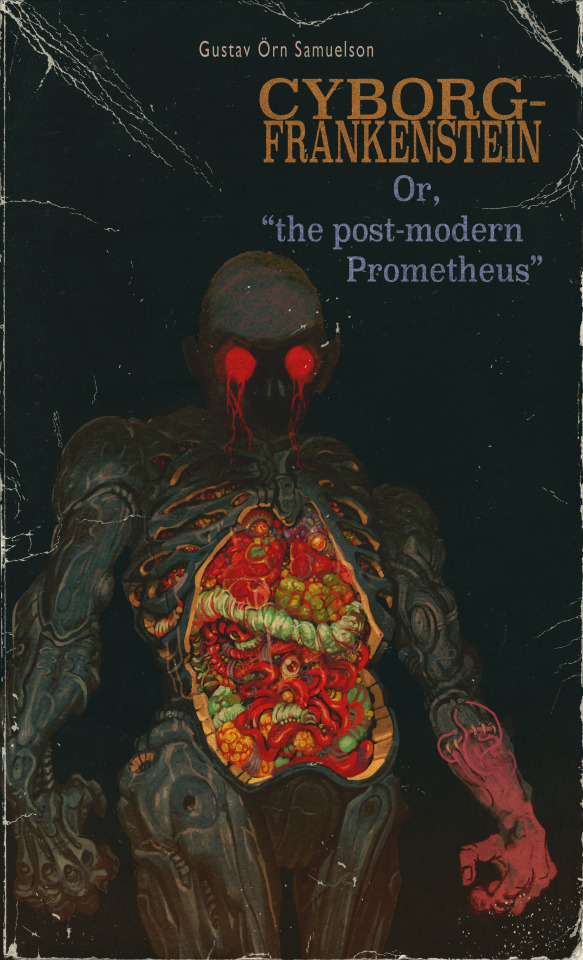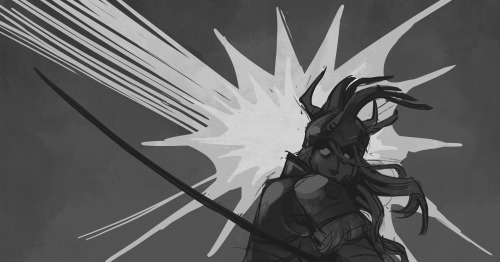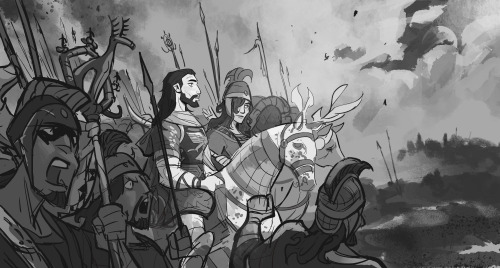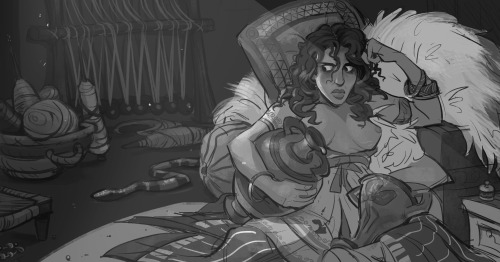Quick Painting Before I Go Pass Out

Quick painting before I go pass out
More Posts from Phaespxria and Others
Hey friend,
Just curious about some greek retellings you like? I tried to get through 'Clytemnestra' by constaza casti but even the first few chapters felt so anachronistic and out of character I returned the book.
i love till we have faces by c.s. lewis. not encouraging to me that no one** has come up with anything better in that vein (that is, "more or less straightforward retelling from an overlooked female character's perspective") since a white english man in the 50s.
**no one i've READ YET, i should say
but if you step away from the formula of narrative fiction, there's good stuff! denis o'hare and lisa peterson's "an iliad" and derek walcott's "the odyssey" are both interesting plays. of course, my beloved hadestown. alice oswald's poems "memorial" (drawn from the iliad) and "nobody" (drawing much more loosely on the odyssey) are [kisses fingers]. in louise glück's poetry collection meadowlands, she uses the odyssey throughout as a way of exploring marriage and parenthood; it's excellent. the lost books of the odyssey is a short story collection by zachary mason; like most short story collections, i found it very mixed, but it has a few stories i've returned to again and again.


gods' blessing
penelope didn't have to turn the tree bed into a riddle. she could have asked odysseus to prove his identity, to tell her something only he would know — which she actually did a few books earlier, when she asked the beggar to describe odysseus, and odysseus told her about a purple cloak with a particular golden brooch that she fastened herself twenty years ago. when penelope tells telemachus they have signs by which they'll know each other, you sort of expect more of the same. and instead, she decides to trap him. like a bug in a cup.
and it's delightful to me, idk, how odysseus has been trapped and cornered in various way throughout the odyssey, but arguably never so that he has to tell the truth to get out. (with the phaeacians, maybe? the omniscient narrator corroborates some of what he tells them, but do we really know everything?) and in fact he is not trying to get free of penelope. he wants something from her, wants to convince her, wants to be welcomed home, but until this point he's lied to her, revealed himself to other people before her, and been distant with her (though also patient! he doesn't try to strongarm or rush her into accepting him; it's his idea to sleep elsewhere).
except penelope isn't looking for him to be distant and patient. penelope lies in a way that requires odysseus to stop playing along — not only to prove that he knows what odysseus knows, but that he's willing to tell the truth about himself.

reunion.
some sketch I drew in March;)




he was right to fear the helmet: it makes it impossible to tell father from foe.
The last image was the first image and only one I meant to make. starting thought (that I don't think I communicated well tbh): "A shot looking up the walls of Troy where Odysseus is dangling Astyanax from the top by his heel, reminiscent of Thetis dipping Achilles, ready to plunge him into his namesake, the river Scamander, brimming with Trojan blood below, while the Achaeans watch in expectation. And the walls are cyclopean, of course!"
you know. standard classicist mental illinois.
maybe one day i'll be better at art and think of a better way to communicate that concept? dipping the baby in the river to cement his legacy? idk. i'll probably come back to it someday.

“Penelope Unravelling the Web,” by Willy Pogany
Illustration for “The Adventures of Odysseus and the Tale of Troy” (aka “The Children’s Homer”), by Padraic Colum

Cyborg Frankenstein.

Blessed with visions pt. 3




–if that ever happened.
“Moreover, the language she uses of herself evokes the heroes of Greek epic and specifically Achilles - “equal to the gods, save for death alone”. Death gives Polyxena the opportunity to confer herolike status upon herself, while condemning the Greeks for the life and the assault they would have subjected her to.”
— Casey Dué, The captive woman’s lament in Greek tragedy
-
 unkownbee liked this · 1 week ago
unkownbee liked this · 1 week ago -
 cloudspoem liked this · 1 week ago
cloudspoem liked this · 1 week ago -
 remembertosaygoodbye liked this · 2 weeks ago
remembertosaygoodbye liked this · 2 weeks ago -
 m4yh4ps liked this · 2 weeks ago
m4yh4ps liked this · 2 weeks ago -
 franchuuachuu liked this · 2 weeks ago
franchuuachuu liked this · 2 weeks ago -
 katco-cereal liked this · 3 weeks ago
katco-cereal liked this · 3 weeks ago -
 dasfeministmermaid liked this · 3 weeks ago
dasfeministmermaid liked this · 3 weeks ago -
 buddhistwithoutbuddhism liked this · 3 weeks ago
buddhistwithoutbuddhism liked this · 3 weeks ago -
 topazmum liked this · 3 weeks ago
topazmum liked this · 3 weeks ago -
 insertgoodnamehere liked this · 1 month ago
insertgoodnamehere liked this · 1 month ago -
 colliexcarrot liked this · 1 month ago
colliexcarrot liked this · 1 month ago -
 bemused-valkyrie liked this · 1 month ago
bemused-valkyrie liked this · 1 month ago -
 oatmealdoodles liked this · 1 month ago
oatmealdoodles liked this · 1 month ago -
 colorful-chromatics liked this · 1 month ago
colorful-chromatics liked this · 1 month ago -
 drawing-down-th3-moon liked this · 1 month ago
drawing-down-th3-moon liked this · 1 month ago -
 quite-the-mystery liked this · 1 month ago
quite-the-mystery liked this · 1 month ago -
 fanofmanyfandomsbc reblogged this · 1 month ago
fanofmanyfandomsbc reblogged this · 1 month ago -
 fanofmanyfandomsbc liked this · 1 month ago
fanofmanyfandomsbc liked this · 1 month ago -
 idfkplskillme liked this · 1 month ago
idfkplskillme liked this · 1 month ago -
 bertholdwizner liked this · 1 month ago
bertholdwizner liked this · 1 month ago -
 garlicscreeb liked this · 1 month ago
garlicscreeb liked this · 1 month ago -
 lilyppp liked this · 1 month ago
lilyppp liked this · 1 month ago -
 aeoluswinds liked this · 2 months ago
aeoluswinds liked this · 2 months ago -
 jiangxianeden liked this · 2 months ago
jiangxianeden liked this · 2 months ago -
 aimless-twig liked this · 2 months ago
aimless-twig liked this · 2 months ago -
 sunshine-moonshine12 liked this · 2 months ago
sunshine-moonshine12 liked this · 2 months ago -
 whimsquirksandstuff liked this · 2 months ago
whimsquirksandstuff liked this · 2 months ago -
 justmlem liked this · 2 months ago
justmlem liked this · 2 months ago -
 six-feet-underneath reblogged this · 2 months ago
six-feet-underneath reblogged this · 2 months ago -
 sweetmentalityshark liked this · 2 months ago
sweetmentalityshark liked this · 2 months ago -
 oraproea liked this · 2 months ago
oraproea liked this · 2 months ago -
 somaticknitter liked this · 2 months ago
somaticknitter liked this · 2 months ago -
 embryocaesar liked this · 2 months ago
embryocaesar liked this · 2 months ago -
 bella-brisk8 liked this · 2 months ago
bella-brisk8 liked this · 2 months ago -
 figgyg1 liked this · 2 months ago
figgyg1 liked this · 2 months ago -
 saeshoreraine liked this · 3 months ago
saeshoreraine liked this · 3 months ago -
 kloudyco liked this · 3 months ago
kloudyco liked this · 3 months ago -
 iilmunchkiin liked this · 3 months ago
iilmunchkiin liked this · 3 months ago -
 randomartistt liked this · 3 months ago
randomartistt liked this · 3 months ago -
 sasu-cat liked this · 3 months ago
sasu-cat liked this · 3 months ago -
 buttercup-draws44 liked this · 3 months ago
buttercup-draws44 liked this · 3 months ago -
 coda-cola-39 liked this · 3 months ago
coda-cola-39 liked this · 3 months ago -
 sirjo-esque liked this · 3 months ago
sirjo-esque liked this · 3 months ago -
 bluesheep-draws liked this · 3 months ago
bluesheep-draws liked this · 3 months ago -
 edgelord27 reblogged this · 3 months ago
edgelord27 reblogged this · 3 months ago -
 edgelord27 liked this · 3 months ago
edgelord27 liked this · 3 months ago -
 rr-raine liked this · 3 months ago
rr-raine liked this · 3 months ago -
 tifrybfwnsfbolbab liked this · 3 months ago
tifrybfwnsfbolbab liked this · 3 months ago -
 jambottled liked this · 3 months ago
jambottled liked this · 3 months ago
